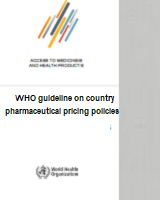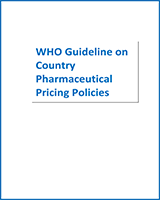The WHO Department of Essential Medicines and Health Products led the development of the guidelines under the oversight of the WHO Guideline Review Committee. A WHO steering committee was responsible for overseeing and managing the guideline development process and comprised WHO staff from: Essential Medicines and Health Products, Public Health, Innovation and Intellectual Property, and Access to Medicines Policy Research, Alliance for Health Policy and Systems Research (HSR/HSS).
A guideline panel was convened to define the scope of the guideline, review the evidence summaries, and develop the recommendations. Panel members included content experts and academic personnel with expertise in the topic, potential end users, and experts skilled in guideline development methodology, in addition to experts from WHO Headquarters and Regional Offices (Annex B). Declarations of interest were collected from panel members and managed according to WHO requirements 2011 (Annex C). The guideline panel held one electronic meeting to agree on the scope of the guideline and one in-person three-day meeting to review the evidence summaries and develop the recommendations.
The guideline scope and development process is described in Annex D, including a specific rationale for not including Grading of Recommendations Assessment, Development and Evaluation (GRADE) tables in these recommendations. Developing an alternative table was not viewed by the panel as having the potential to add value to the usability and clarity of the recommendations.
The evidence considered for the development of the guideline was based on a series of literature reviews v–x completed during 2010–11 by the WHO/HAI collaboration on pharmaceutical prices.xi A global working group convened as part of the WHO/HAI pricing project responsible for oversight and peer review of the series. For each review, literature searches were specified as part of the protocol development and, in particular, searches were done to identify grey literature relevant to low- and middle-income countries. In addition to the WHO/HAI series of literature reviews, additional evidence was retrieved by searching relevant databases (PubMed, EconLit, ISI Web of Knowledge, Cochrane Library) for systematic reviews of pharmaceutical pricing policies identified in the guideline scope.
At the time of guideline protocol development, based on the absence of summary of findings tables in relevant Cochrane reviews, it was determined that that it would not be possible to prepare Grading of Recommendations Assessment, Development and Evaluation evidence profiles, since few publications provided quantitative estimates of the impact of pricing policies on health outcomes or access to medicines. It was therefore predetermined that evidence summaries would prepared as study-by-study tables from each WHO/HAI policy review, supplemented with any systematic reviews retrieved by the additional search.
The guideline development protocol initially proposed that methods used for assessment of the quality of the evidence would be based on advice from the Effective Practice and Organization of Care representative in the guideline panel, depending on the type of studies included. However, the qualitative and anecdotal nature of the evidence was such that formal assessment of the quality of the evidence was not deemed useful and GRADE evidence profiles were therefore not produced.
It was also pre-specified that in the expected absence of any experimental design studies of pharmaceutical policies, evidence from studies using time series design with repeated measures of either health outcomes or access to medicines would be considered as the most reliable basis to determine the estimate of effect of any policy. However, no such research was found; all studies were essentially case descriptions.
The evidence summaries were used as the basis for drafting recommendations and were also part of the review process. WHO staff with support of an expert consultant drafted the initial recommendations and evidence summaries, which were circulated to a separate group for external consultation. This group included experts and organizations representative of the relevant stakeholders, including pharmaceutical industry associations and nongovernmental organizations and international organizations working on access to medicines and pharmaceutical pricing issues. The feedback received from the consultation was considered by the guideline panel in formulating the recommendations. The recommendations and evidence summaries were circulated to the guideline panel prior to the in-person meeting.
The panel met in Geneva in November 2011. The panel determined that, in the absence of evidence-quality grading, it would not be possible to attribute a level of strength to individual recommendations.
The following approach for developing recommendations for each of the six policy topics was used. The panel reviewed the evidence summary, examined their own experience in different settings and countries in relation to the evidence provided, and reached consensus points, including the benefits and downsides of implementation of the policy. The recommendations for each of the six policies resulted from consensus based on the evidence and experiences noted above, with a caveat in each case regarding the paucity of research findings. There was also consensus on principles and considerations relevant to policy selection and implementation.
A full draft guideline was circulated for comment and final approval by the panel. No further peer review was sought at that time since all substantive comments from stakeholders had been considered in formulating the recommendations. The final draft was submitted for WHO publication approval according to the standard processes.


